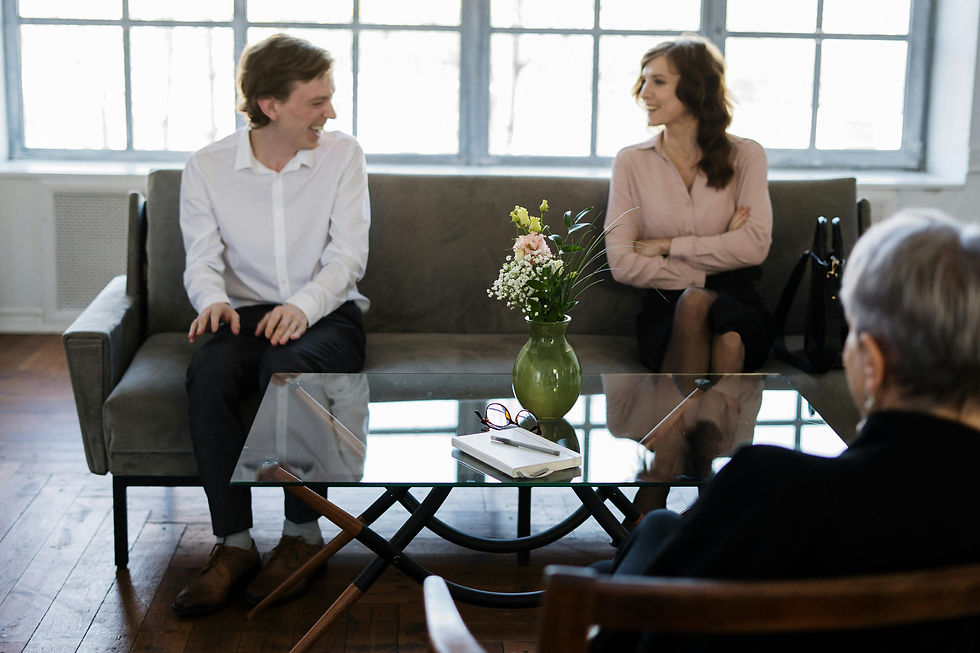Learn to Eliminate Negativity and Step into a Safe Space.
- meganslcsw
- Feb 9, 2024
- 3 min read
Updated: Jun 8, 2024
In our therapy sessions and workshops, we often speak of a “safe space” and the importance of it. To understand and create that space, you need to understand what can quickly disrupt it…negativity.
But what exactly is negativity? How do we know we are being negative?

The MacMillan Dictionary defines negativity as “the attitude of seeing only bad aspects.”
Negativity is any thought, word, or deed that rejects another because of their difference or “uniqueness.” It is an expression that a person experiences as a “put down” that makes them feel unsafe and anxious.
In other words, if whoever you’re in conversation with perceives it as negative, it’s negative! Even if in that moment you did not intend it to be negative.
Words or actions that feel negative to others can inflict emotional injury. Though you may see them as sarcasm or humor, the person who experiences them negatively feels them as abuse. If you find yourself saying, “Can’t you take a joke?” or, “I was only kidding,” or “I’m just offering constructive criticism,” chances are you are inadvertently hurting that person and the relationship.
We are usually unaware of how another may interpret our comments as negative. Suggestions, or constructive criticism we offer with good intentions may feel critical and negative to others. Certain words, a tone of voice, or even an eye roll may all be perceived as communications of criticism, shame, blame, or judgment. Whether intentional or accidental, these communications may land as negative.
When a negative exchange occurs, safety is compromised, a connection is nearly impossible, and our defenses go up. Negativity arouses anxiety in a person; feeling unsafe, they subconsciously begin to anticipate terrible outcomes, and they withdraw or react to protect themselves.
This negative energy blocks any meaningful communication that may have taken place, making it impossible to effectively address whatever you needed to talk about in the first place. In addition to being ineffective, negativity is emotionally harmful, both to the person who perceives it as negative and to the relationship.
Left unresolved, negativity permeates and can destroy all our relationships.
That’s the bad news; the good news is that you can minimize negativity enough to allow safety to flourish and connection to deepen in all your relationships. Our brain is wired with a bias toward negativity - always on the lookout for danger so it can keep us safe. You can’t eliminate negativity altogether, but you have the power to stop it.

Everyone wants to feel connected, accepted and loved. Even though some may say they don’t, it’s our natural human desire and instinct to feel joy. We are all separate individuals with wishes and needs different from each other’s. Accepting these differences is essential to removing negativity.
When you are aware of it, and have built the necessary skills, you can drastically reduce negativity in all its forms from your life and your relationships.
Now that we know what negativity is, let’s look at a safe space. It is not something you can see, or step into, it is a conditional space that you created where you can communicate, get curious, empathetically listen and ultimately connect in a deeper way.
Our brain craves order and security. It perceives “safety” as the absence of perceived danger or the potential for danger. Our brains process negativity as a warning sign of impending danger. To reassure our brains that we are safe, we must create situations that don’t “feel” dangerous.
We can create a safe space by establishing healthy boundaries, being clear about our non-negotiables, and reducing negativity. These parameters tell our brain that no harm will come to us here. Once our brain understands that it relaxes and opens our minds and hearts to allow us to compassionately connect. Creating a safe space also includes the willingness and ability to communicate in a structured way. Read about Imago Dialogue
We have control over ONLY ourselves and the space we create. The people in our lives and situations are going to act as they will, we can’t change them. But using what you know today, and the tools we acquire from Imago Therapy we can create a safe space in any situation or conversation.
Discover more, register for our workshops, or contact Meagan to learn about 30 days to Zero Negativity.




Comments